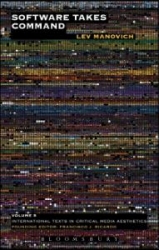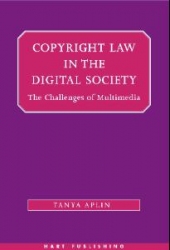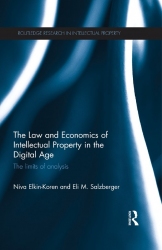
Author : ทรัพย์สินทางปัญญา, กรม
Publishing Date : Jan 05, 2022
รายงานวิเคราะห์แนวโน้มเทคโนโลยีฉบับนี้ มีวัตถุประสงค์เพื่อนำเสนอแนวโน้มเทคโนโลยีที่เกี่ยวข้องกับพลังงานทดแทน ได้แก่ พลังงานแสงอาทิตย์ พลังงานชีวมวล พลังงานขยะ พลังงานลม พลังงานน้ำ พลังงานมหาสมุทร และพลังงานความร้อนใต้ภิภพ โดยนำข้อมูลจากฐานข้อมูลสิทธิบัตรไทยและต่างประเทศมาวิเคราะห์ข้อมูล ดังกล่าวจะแสดงให้เห็นถึงเทคโนโลยีที่เกี่ยวข้องกับพลังงานทดแทนในปัจจุบันและแนวโน้ม
เทคโนโลยีด้านพลังงานทดแทนที่กำาลังจะเกิดขึ้นในอนาคต

Author : Lev Manovich
Publishing Date : Apr 30, 2014
store, distribute and interact with cultural artifacts. It has become our interface to the world, to others, to our memory and our imagination - a universal language through which the world speaks, and a universal engine on which the world runs. What electricity and combustion engine were to the early 20th century, software is to the early 21st century. Offering the the first theoretical and historical account of software for media authoring and its effects on the practice and the very concept of ‘media,’ the author of (2001) develops his own theory for this rapidly-growing, always-changing field. What was the thinking and motivations of people who in the 1960 and 1970s created concepts and practical techniques that underlie contemporary media software such as Photoshop, Illustrator, Maya, Final Cut and After Effects? How do their interfaces and tools shape the visual aesthetics of contemporary media and design? What happens to the idea of a ‘medium’ after previously media-specific tools have been simulated and extended in software? Is it still meaningful to talk about different mediums at all? Lev Manovich answers these questions and supports his theoretical arguments by detailed analysis of key media applications such as Photoshop and After Effects, popular web services such as Google Earth, and the projects in motion graphics, interactive environments, graphic design and architecture. Software Takes Command is a must for all practicing designers and media artists and scholars concerned with contemporary media.

Author : Martin Weller
Publishing Date : Apr 29, 2014
While industries such as music, newspapers, film and publishing have seen radical changes in their business models and practices as a direct result of new technologies, higher education has so far resisted the wholesale changes we have seen elsewhere. However, a gradual and fundamental shift in the practice of academics is taking place. Every aspect of scholarly practice is seeing changes effected by the adoption and possibilities of new technologies. This book will explore these changes, their implications for higher education, the possibilities for new forms of scholarly practice and what lessons can be drawn from other sectors.

Author : Nagla Rizk
Publishing Date : Apr 29, 2014
This book is an important contribution to recovering a nuanced, contextually aware view of access to knowledge and global knowledge governance Yochaie Benkler, Harvard Law School
This is a 'must read' for scholars and practioners interested in economic devlopment, cultural production and access to knowledge Susan Sell, George Washington University
This volume features five chapters on current issues facing intellectual property, innovation and development policy from the Egyptian perspective. These include: information and communications technology for development, copyright and comparative business models in music, free and open source software, patent reform and access to medicines, and the role of the Egyptian government in promoting access to knowledge internationally and domestically.
Together these chapters offer an overview of the challenges and opportunities facing efforts to promote access to knowledge. Combining both theoretical and pragmatic approaches, the work will be of interest to scholars and practitioners dealing with intellectual property and innovation property the world over.

Author : Vaike Fors, Sarah Pink, Martin Berg, Tom O'Dell
Publishing Date : May 04, 2020
Digital self-tracking devices and data have become normal elements of everyday life. Imagining Personal Data examines the implications of the rise of body monitoring and digital self-tracking for how we inhabit, experience and imagine our everyday worlds and futures. Through a focus on how it feels to live in environments where data is emergent, present and characterized by a sense of uncertainty, the authors argue for a new interdisciplinary approach to understanding the implications of self-tracking, which attends to its past, present and possible future. Building on social science approaches, the book accounts for the concerns of scholars working in design, philosophy and human-computer interaction. It problematizes the body and senses in relation to data and tracking devices, presents an accessible analytical account of the sensory and affective experiences of self-tracking, and questions the status of big data. In doing so it proposes an agenda for future research and design that puts people at its centre.

Author : Paul Mihailidis
Publishing Date : Sep 03, 2018
Civic life today is mediated. Communities small and large are now using connective platforms to share information, engage in local issues, facilitate vibrant debate, and advocate for social causes. In this timely book, Paul Mihailidisexplores the texture of daily engagement in civic life, and the resources—human, technological, and practical—that citizens employ when engaging in civic actions for positive social impact. In addition to examining the daily civic actions that are embedded in media and digital literacies and human connectedness, Mihailidis outlines a model for empowering young citizens to use media to meaningfully engage in daily life.

Author : Steven E. Jones
Publishing Date : Aug 15, 2013
The past decade has seen a profound shift in our collective understanding of the digital network. What was once understood to be a transcendent virtual reality is now experienced as a ubiquitous grid of data that we move through and interact with every day, raising new questions about the social, locative, embodied, and object-oriented nature of our experience in the networked world.
In The Emergence of the Digital Humanities, Steven E. Jones examines this shift in our relationship to digital technology and the ways that it has affected humanities scholarship and the academy more broadly. Based on the premise that the network is now everywhere rather than merely "out there," Jones links together seemingly disparate cultural events—the essential features of popular social media, the rise of motion-control gaming and mobile platforms, the controversy over the "gamification" of everyday life, the spatial turn, fabrication and 3D printing, and electronic publishing—and argues that cultural responses to changes in technology provide an essential context for understanding the emergence of the digital humanities as a new field of study in this millennium.

Author : Tanya Aplin
Publishing Date : Sep 10, 2014
examines the extent to which copyright and database right protect multimedia works. It does so from the perspective of UK law, but with due attention being paid to EU law, international treaties and comparative developments in other jurisdictions, such as Australia and the U.S. The central argument of the book is that the copyright and database right regimes are, for the most part, flexible enough to meet the challenges presented by multimedia. As a result, it is neither necessary nor desirable to introduce separate copyright protection or sui generis protection for multimedia works.
This important and original new work will be essential reading for any lawyer engaged in advising on IP matters relating to the new media industries, and scholars and students working in intellectual property and computer law.

Author : Simon Stokes
Publishing Date : Mar 06, 2015
The first edition of this book in 2002 was the first UK text to examine digital copyright together with related areas such as performers' rights, moral rights, database rights and competition law as a subject in its own right. Updated editions have included the UK implementation of the 2001 Information Society Directive and commentary on user-generated content and the development of Web 2.0 and beyond. Now in its fourth edition, the book has been updated and revised to take account of legal and policy developments in copyright law and related areas, in particular the increasing role of the Court of Justice of the European Union in shaping EU copyright law. The book helps put digital copyright law and policy into perspective and provides practical guidance for those creating or exploiting digital content or technology, whether in academia, the software, information, publishing and creative industries, and other areas of the economy. The focus is on the specifics of the law in this area together with practical aspects, including precedents and precedent checklists dealing with common digital copyright transactions. The latest edition has been expanded to include a discussion of Open Access, eBooks and app development and licensing. Both academics and practitioners will find the book an invaluable guide to this rapidly developing field of law.

Author : Niva Elkin-Koren, Eli Salzberger
Publishing Date : Nov 27, 2012
This book explores the economic analysis of intellectual property law, with a special emphasis on the Law and Economics of informational goods in light of the past decade’s technological revolution. In recent years there has been massive growth in the Law and Economics literature focusing on intellectual property, on both normative and positive levels of analysis. The economic approach to intellectual property is often described as a monolithic, coherent approach that may differ only as it is applied to a particular case. Yet the growing literature of Law and Economics in intellectual property does not speak in one voice. The economic discourse used in legal scholarship and in policy-making encompasses several strands, each reflecting a fundamentally different approach to the economics of informational works, and each grounded in a different ideology or methodological paradigm.
This book delineates the various economic approaches taken and analyzes their tenets. It maps the fundamental concepts and the theoretical foundation of current economic analysis of intellectual property law, in order to fully understand the ramifications of using economic analysis of law in policy making. In so doing, one begins to appreciate the limitations of the current frameworks in confronting the challenges of the information revolution. The book addresses the fundamental adjustments in the methodology and underlying assumptions that must be employed in order for the economic approach to remain a useful analytical framework for addressing IPR in the information age.
12NextLast


